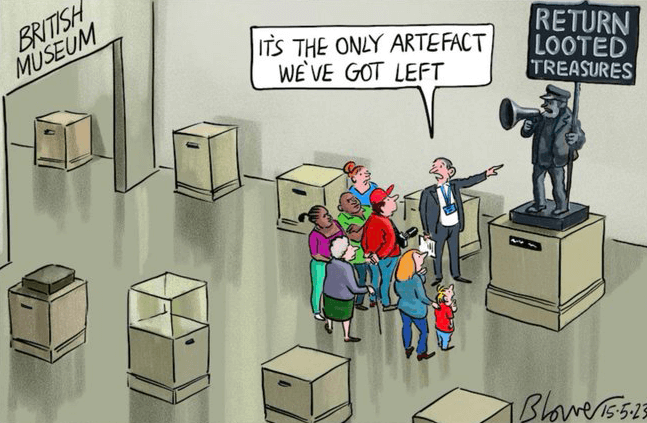“They belong to Greece! These treasures belong to the people of Greece!”

SHAME ON THE BRITISH FOR STEALING THE GREEK MARBLES!
“I’d like to say it was bad luck for the Greek’s. First, they were stolen and then they were lost in a shipwreck.”


“I would like to recognize my son-in-law Richard Donahoo (attorney) who brought this issue to my attention!”
THE TREASURES THAT SANK WITH THIS SHIP BELONG TO GREECE AND TO THE WORLD, CERTAINLY NOT TO ELGIN OR THE BRITISH!
“I cannot believe that the British Government would continue a lie in order to profit from someone else’s treasure.”

“Greece is a poor country and does not deserve to be ripped off by a bigger richer country.”
World court rulings and the Parthenon Marbles: a legal overview
The dispute surrounding the Parthenon Marbles (also known as the Elgin Marbles), currently held in the British Museum, has not been directly addressed by a ruling from the International Court of Justice (ICJ) or any other major international court with the power to compel their return.
However, the question of the marbles’ return has been explored and debated within various international legal and diplomatic contexts:
1. Lack of direct rulings and reasons
- No International Court has ruled on the merits of the case due to various factors, including the temporal limitations of relevant treaties and conventions, and challenges regarding jurisdiction and standing.
- For instance, the European Court of Human Rights (ECHR) dismissed a case brought by a cultural group arguing for the return of the Marbles, citing the time elapsed since their removal and the lack of individual standing to bring the claim.
- The 1970 UNESCO Convention on the Means of Prohibiting and Preventing the Illicit Import, Export and Transfer of Ownership of Cultural Property is generally seen as the primary international instrument governing the repatriation of cultural property, according to the auilr. However, the Convention’s non-retroactive nature limits its direct applicability in this case as the marbles were removed prior to its enactment.
2. Attempts at intervention and mediation
- UNESCO has played a significant role by fostering dialogue and offering mediation between Greece and the United Kingdom.
- In 2021, UNESCO’s Intergovernmental Committee for Promoting the Return of Cultural Property to its Countries of Origin or its Restitution in Case of Illicit Appropriation (ICPRCP) issued a recommendation urging the British Museum to engage in discussions regarding the marbles’ repatriation, but the British Museum has maintained its current position.
3. Diplomatic efforts and evolving international opinion
- Greece has consistently pursued the return of the marbles through diplomatic channels and bilateral negotiations.
- The Greek government has argued that the marbles were illegally acquired, that they are an integral part of Greece’s cultural heritage and identity, and that their removal significantly impairs these interests.
- Recent reports indicate ongoing negotiations between the British Museum and Greece potentially exploring a long-term loan or cultural exchange agreement, although legal ownership remains a point of contention.
- The British Museum’s position rests on the claim that Lord Elgin acquired the marbles legally under the laws and customs of the time and that the museum therefore holds legal title.
- International opinion regarding the return of cultural property has been evolving, with growing recognition of the importance of cultural heritage to national identity and the need for restitution in appropriate cases.
4. Other related legal discussions
- Some scholars argue for the applicability of customary international law, suggesting that even in the absence of explicit treaty provisions, a customary international law rule necessitating the return of cultural heritage of particular importance that has been unlawfully removed could be applied.
- The ICJ’s jurisprudence shows a tendency to consider the value of cultural heritage when interpreting other norms of international law, indicating an increased awareness of the importance of cultural property protection.
In conclusion
While there have been no binding rulings from international courts compelling the return of the Parthenon Marbles, the issue remains a prominent topic in international legal and cultural discourse. The ongoing diplomatic efforts, shifts in international opinion regarding cultural property, and continued scholarly discussion contribute to the evolving landscape surrounding this complex and long-standing dispute.

“The British will need to return the Parthenon Marbles that they stole from Greece in the 18th century, and pay all the money they made charging “Greeks” to look at their own treasure.”

“This is illegal and unethical!” The World should raise hell and get these treasures returned to Greece as soon as possible” PLEASE BOYCOTT THE BRITISH MUSEUMS!” They should return the money they made to the people of Greece!

“I wish the British people recognize the crimes of their government and return the stolen Parthenon marbles to Greece where they belong!”
The British silence is deafening!

“I would like to recognize my Daughter Natalie and her husband Richard for the information on this page they have helped me with my webite, have been my mentors, both successful attorneys, as well as being great parents.”
